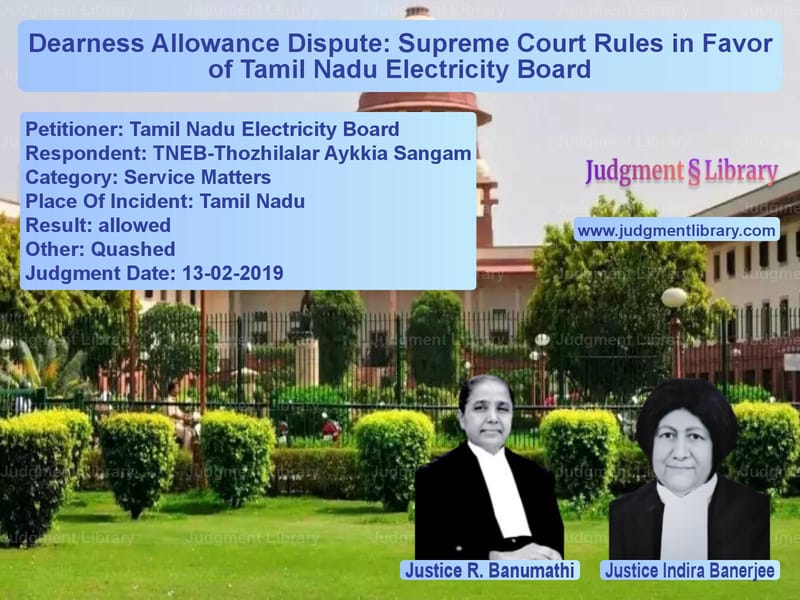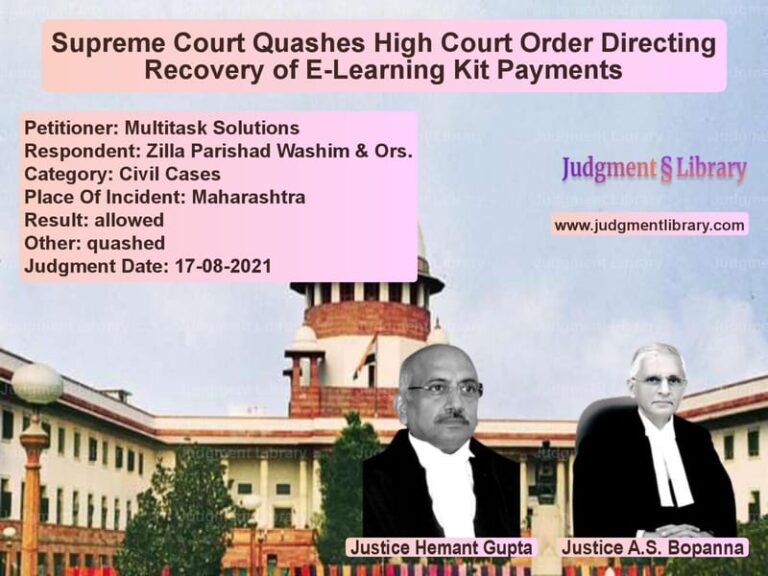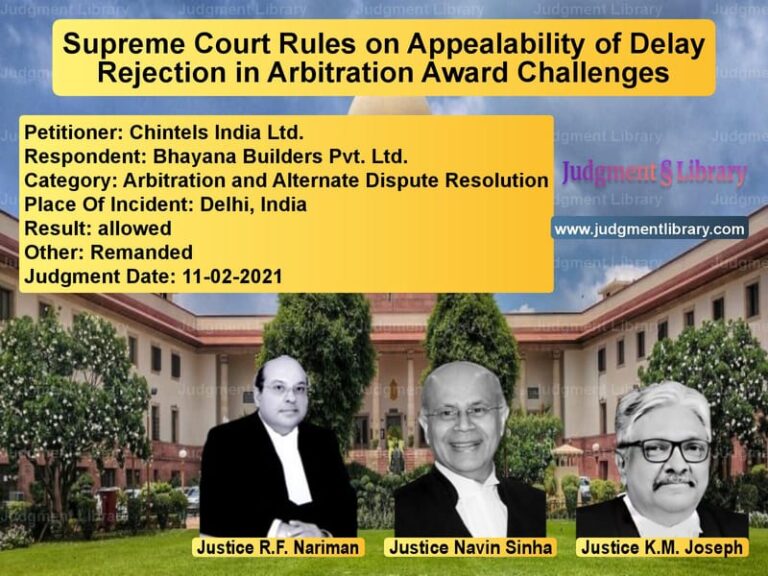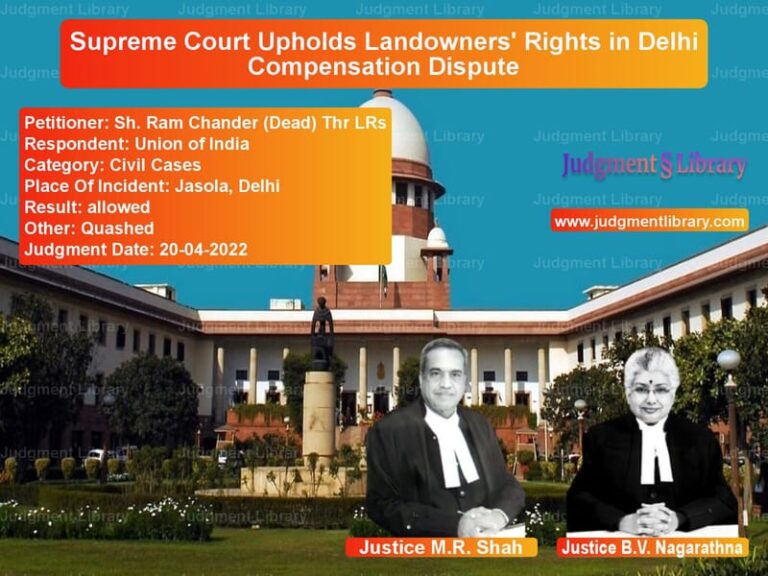Dearness Allowance Dispute: Supreme Court Rules in Favor of Tamil Nadu Electricity Board
The case of Tamil Nadu Electricity Board vs. TNEB-Thozhilalar Aykkia Sangam revolves around the issue of the payment of Dearness Allowance (DA) to employees of the Tamil Nadu Electricity Board (TNEB). The Supreme Court addressed whether the Board was obligated to provide DA at the same rate as Central Government employees or whether it could follow the Tamil Nadu State Government’s financial policies. The judgment clarifies how financial constraints and employer policies impact the obligation to provide enhanced allowances.
Background of the Case
The dispute arose over the revision of DA for TNEB employees for a period of nine months:
- 4% increase (from 45% to 49%) from 01.01.2002 to 30.06.2002
- 7% increase (from 45% to 52%) from 01.07.2002 to 30.09.2002
A Memorandum of Settlement was recorded on 08.07.1998 between TNEB and its employees, stating that DA would be revised twice a year based on the All India Consumer Price Index and the formula followed by the Tamil Nadu Government. However, the Board issued a proceeding (BP (FB) No.58) stating that DA would be sanctioned at the same rate and from the same date as granted by the Tamil Nadu Government.
While the Central Government increased DA to 49% on 01.01.2002, Tamil Nadu did not revise DA until 01.10.2002 due to financial constraints. The TNEB followed the state government’s policy and granted the revision from 01.10.2002 instead of 01.01.2002.
Petitioner’s Arguments
The Tamil Nadu Electricity Board (TNEB) contended:
- The wage settlement of 1998 and BP (FB) No.58 required TNEB to follow the Tamil Nadu Government’s DA policy, not the Central Government’s policy.
- The High Court had incorrectly relied on previous judgments that dealt with crediting arrears to provident fund accounts, which were unrelated to this dispute.
- As a state government undertaking, the Board was financially dependent on the Tamil Nadu Government, which faced financial difficulties in 2002.
- Employees of TNEB were not equivalent to Central Government employees, and their financial benefits could not be equated.
Respondent’s Arguments
The employee union, TNEB-Thozhilalar Aykkia Sangam, argued:
- The settlement agreement of 1998 stipulated that DA should be revised based on the All India Consumer Price Index, which was followed for years.
- BP (FB) No.58 unilaterally altered the settlement terms by linking DA to Tamil Nadu Government employees instead of applying the standard price index formula.
- The delay in granting the DA increase violated the terms of the wage settlement.
- TNEB employees were governed by labor laws and should not be bound by the state government’s financial constraints.
Supreme Court’s Observations
The Supreme Court analyzed the legality of TNEB’s decision and made the following key observations:
“The obligation to pay enhanced Dearness Allowance depends upon the employer’s financial position and other factors.”
The Court noted that the settlement agreement linked DA revisions to the Tamil Nadu Government, not the Central Government:
“Having agreed for the grant of revised Dearness Allowance on par with the State Government employees, the respondent(s) union cannot seek for revision at a higher rate.”
The judgment emphasized that financial constraints were a valid reason for delaying the implementation of the DA increase:
“The Tamil Nadu Government faced an acute financial crisis in 2001-2002, and the Board’s decision to revise DA only from 01.10.2002 instead of 01.01.2002 was reasonable.”
Final Judgment
The Supreme Court ruled:
- The High Court erred in directing TNEB to pay DA at Central Government rates.
- TNEB correctly followed the Tamil Nadu Government’s policy in granting DA revisions.
- The Board’s financial constraints justified its decision to implement DA increases only from 01.10.2002.
- The appeals were allowed, and the High Court’s orders were set aside.
Conclusion
This judgment reaffirms the principle that financial constraints and employer agreements dictate employee benefits. The ruling clarifies that state government undertakings like TNEB are not obligated to match Central Government allowances unless explicitly agreed upon, ensuring that fiscal responsibility remains a crucial factor in determining employee compensation.
Petitioner Name: Tamil Nadu Electricity Board.Respondent Name: TNEB-Thozhilalar Aykkia Sangam.Judgment By: Justice R. Banumathi, Justice Indira Banerjee.Place Of Incident: Tamil Nadu.Judgment Date: 13-02-2019.
Don’t miss out on the full details! Download the complete judgment in PDF format below and gain valuable insights instantly!
Download Judgment: Tamil Nadu Electrici vs TNEB-Thozhilalar Ayk Supreme Court of India Judgment Dated 13-02-2019.pdf
Direct Downlaod Judgment: Direct downlaod this Judgment
See all petitions in Pension and Gratuity
See all petitions in Public Sector Employees
See all petitions in Judgment by R. Banumathi
See all petitions in Judgment by Indira Banerjee
See all petitions in allowed
See all petitions in Quashed
See all petitions in supreme court of India judgments February 2019
See all petitions in 2019 judgments
See all posts in Service Matters Category
See all allowed petitions in Service Matters Category
See all Dismissed petitions in Service Matters Category
See all partially allowed petitions in Service Matters Category







